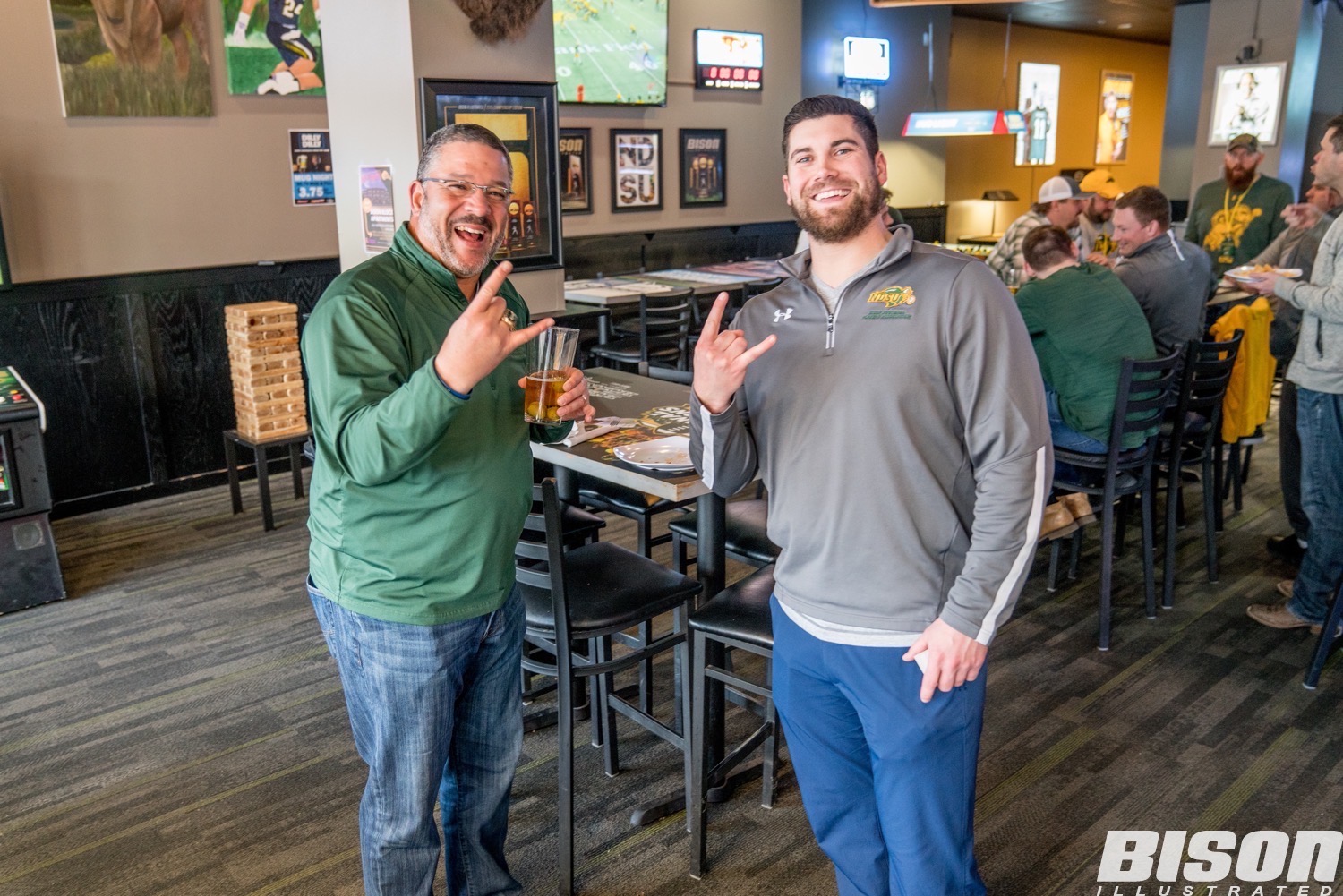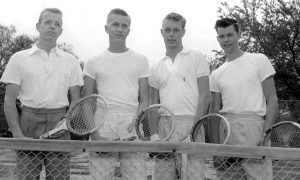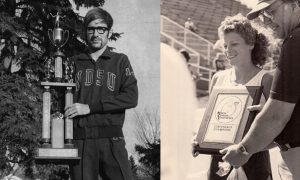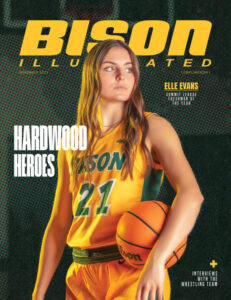Photos By Hillary Ehlen/Paul Flessland
Formed in 2016, the Bison Football Players Association has become a vital outlet for former NDSU players. Not only is it a great way to connect with generations worth of Bison football players, but it is also a connective resource for many. Through this vast network of former Bison, one can only imagine the stories and tales told between each of the 427 members.
Bison greats Chuck Klabo and Cole Jirik lead the charge forward for the BFPA. Klabo, the organization’s president, was recently selected to become a member of the Bison Athletic Hall of Fame. He was an All-American offensive tackle for NDSU from 1999 to 2002.
Jirik, who is BFPA’s vice president, was a stalwart defensive end for the Bison from 2009 to 2013. An All-Missouri Valley selection, Jirik could very well find himself in the Bison Athletic Hall of Fame as time passes.
Both are now focused on growing an already solid membership base for BFPA. Despite the pandemic era we’re living in, BFPA has still found ways to grow and support fellow members of Bison Nation.
We discussed the organization’s growth and more with Klabo and Jirik.
Upon its inception when did you guys first get involved? And how did you segway into a leadership position?
Chuck Klabo: It’s amazing how the time flies by. I believe it was 2016 that the group got together and really wanted to find a way to bring the players together to act as a conduit to continue to bring everybody together. We’ve got such a strong heritage or whatever you want to call it.
It’s so much fun to be around this organization and the amount of pride that everybody has for the football program and in the university. It’s so much fun to see.
Fast forward four years, and we now have 427 members. That is something that we’re very proud of and we’re continuing to look for ways to attract additional members. We’re continuing to stay in touch with the recent graduates and trying to get them involved as much as we possibly can. It’s pretty neat, because we’ve got individuals living across the country, many states, and that’s quite powerful. This platform exists to be able to spread our message and then help others out.
Cole Jirik: I was kind of there from the start. We got a group of guys together, eight or 10 of us at Labby’s this one night. We sat down and started talking about how many different situations we can help with. Guys were getting sick, guys were passing away and they just needed help in certain situations. If it’s helping someone move or whatever the situation would be, we didn’t really have that piece set up.
We always talk about NDSU, and how it is a family and it is when you’re there. That piece was kind of missing from when we finally left. Sure, you have the guys in your class, and you still hang out with them. For me the opportunity to meet guys that played in the ‘60s, ‘70s, ‘80s, ‘90s and 2000s is incredible. Even meeting the guys that are just finishing up playing now is something that means a lot to me. You hear so many of the same stories, it’s just a different era, different guides, but it’s the same thing over and over
again.
Once we got this thing off the ground, we really had no idea what we were doing or where we’re going with things and we’re able to get things together. Guys bought in really quickly too. I think a lot of guys missed that team aspect of things and being together. For us to have an event every year where we can get as many guys together and honor the senior class that came through and give them a gift is important. We introduce them to guys that used to play and start building those connections. Maybe it will help a guy get an internship or get a job or the right guy that he needs for certain situations.
From early on, I loved helping with things. My big thing early on was events and helping plan that stuff. I just got more and more involved and I jumped at the chance to be VP.
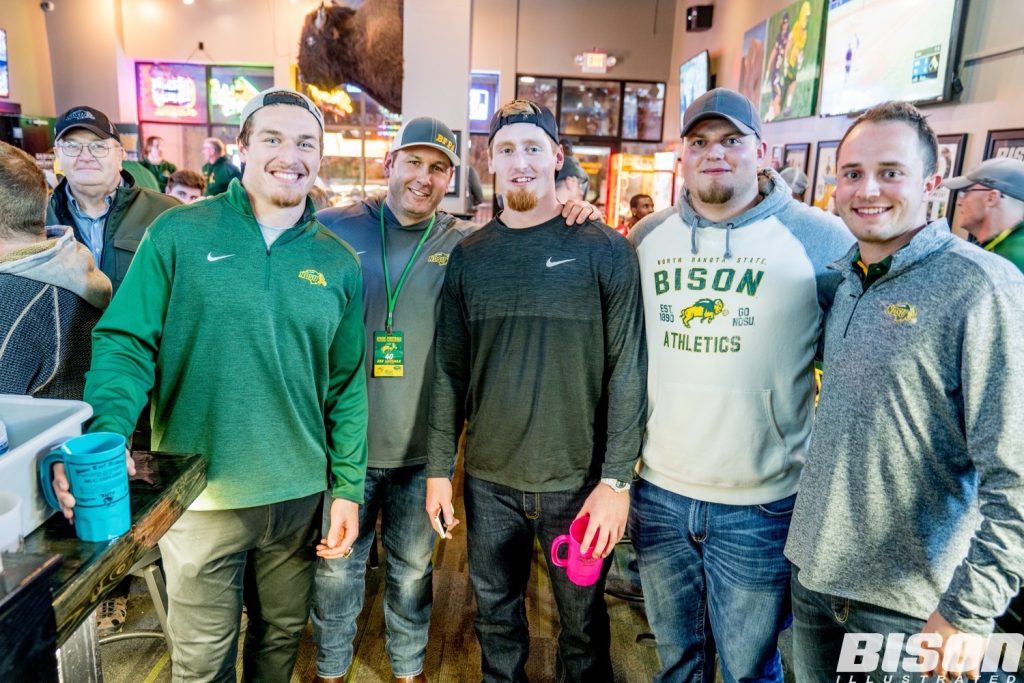
You brought up trying to bring in recent grads upon them being done with football at NDSU. How does that process go for you guys, in terms of reaching out and finding those recent grads of the football program, and trying to bring them full circle into the BFPA? How do you kind of go about that process?
CK: I think that we’ve got a multifaceted approach to it. Obviously, we’re very active and involved in the program, just the members in general. We’ve got a lot of members that love to be at the games and that are always around. I think that social media continues to help. I think that as a player gets further along in their career, and they start to understand just the overall power of what Bison football and Bison Nation is, they see this as a group that they want to be a part of. We’re fortunate to be able to visit with them and once we’re able to talk with them, they quickly understand that this a neat club to be a part of. For them, it’s a great opportunity to get to know people and people from different eras.
Whenever we talk with athletes that are currently playing football, they always seem to fit in something about ‘doing it for the people that came before us’. They’re always talking about previous athletes that played at their position. How do you think the BFPA factors into the current football roster? How does that tradition factor into what Bison football is doing in the present day?
CK: Without a doubt, the program has continued to evolve. The growth that we’ve seen, the level of success and the national stage is a part of this evolution. However, it’s also fun to look back and see there is so much tradition. When you look at the NDSU program, the core of what they’re doing hasn’t changed. Where I see that is even when I’m able to have conversations with current players or ones that came before or after me. The discussions that we have, it’s the same stuff, the same stories and the same goals. It’s the same mindset. I think that’s why it’s so easy to relate to everybody and why we ended up with such a close-knit group. There’s a lot that hasn’t changed and I think that’s a big part of what’s helped make NDSU such a special place.
Cole brought up meeting players from the ‘60s and ‘70s. You’re talking about seven generations worth of football players. That’s a wide scope of guys who played football. For you guys, how special and how important is it for you to have those relationships with guys that played in the ‘60s or with guys that played after you? How important is it to continue to cultivate those relationships with seven generations worth of Bison football players?
CJ: That’s one of the biggest things for me when I was a player and whatnot. You hear so many stories of guys that have played at this place. One of the biggest reasons I committed to NDSU was the history and tradition of this place. I was in the Metrodome on a recruiting trip with the Minnesota Gophers when Tyler Roehl ran around all over the Gophers. I started to dive into this program, and it’s pretty special. There have been so many great players to come through and great people and guys are just willing to help each other.
People ask me what’s so special about NDSU and it’s just the culture. For me, to be able to meet guys that helped build this culture from the ‘60s, ‘70s, ‘80s or ‘90s is special. We talk football and kind of get back to that locker room-type feel. I think that was a really big and beneficial process of becoming an adult after football. That transition process is really, really difficult and something I struggled with for a good amount of time. When football was gone, I didn’t know what to do with my time. I know a lot of guys share their stories about that transition period and it being tough on them. So the BFPA has that support system and that was huge for me. I wanted to kind of lend it to the guys that are now graduating from the program. It’s good to have those conversations.
CK: I look at all the areas we talked about and laying a foundation and stuff. That starts with all of those people. They tell the same story, have the same traditions, just different eras. I have so much fun attending the events that we have because it’s so nice to talk to people and there is such a strong bond.
It’s been a challenging year for everyone. For you guys, what have been some of those challenges getting through COVID-19? How challenging has it been not being able to have those events and those moments?
CJ: It’s been tough. The biggest thing is every Saturday, there’s just nothing there. There is something missing. That’s been the hardest part because we always set up a tailgating spot and some weeks we get a bunch of guys out there. Some guys don’t travel for certain weeks and whatnot too. Over the course of the season, you see a good chunk of that BFPA community roll through the tailgating lot and into a game at some point. That’s been really difficult for us. Last spring is normally when we have our senior event where we honor that senior class and present them with a framed jersey. We get to start bringing them into the BFPA. To not have that was maybe one of our biggest things that hurt. Not having that with the senior class was hard. We’re still trying to plan and work something out with them. It’s a challenging time for everybody.
CK: You look at college athletics and you’re sympathetic. You’re sympathetic to the players and coaches because it is a short window already and now it’s a shorter window. There has been a lot of change and a lot of disruption. I think we all are missing having these Saturday tailgates and getting to watch the game.
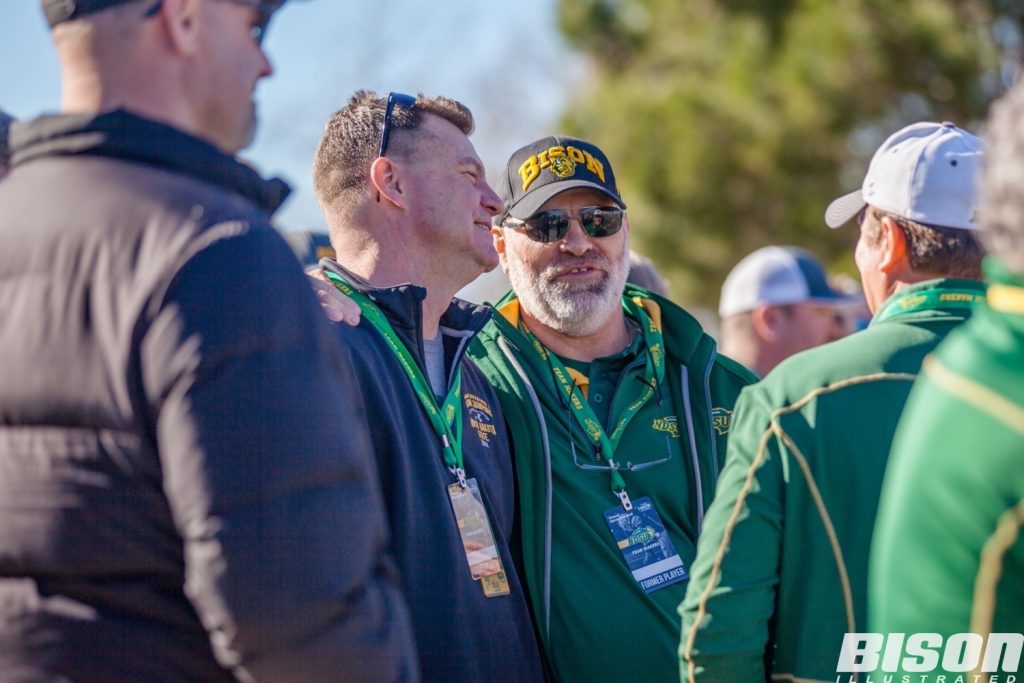
What are some tangible goals that you’ve set forth for BFPA? Whether it’s getting to 500 members or maybe it’s getting to 1000 members or having certain events added to the schedule. What are some of those goals that you guys have set forth for the organization?
CJ: Growing the membership is huge, but just growing the relationship with the current players, and I’m building a mentorship program with them. The biggest thing for us would just be membership and being able to get back in. For me, what I want us to be able to do this year is just to let everybody know what we’ve done for the last five years. I don’t think a lot of people actually really know how many people’s lives we’ve impacted. Even if it’s simple things like a player’s brother has to go into emergency heart surgery the day before he was supposed to move out of this house. This group got together and helped move them so he could be with his brother in the hospital and not have to worry about trying to move. Or a player who passes away the day before he was supposed to move to Colorado. This group stepped up and got his family a place to stay and helped with that adjustment period.
Last year we did a giant toy drive for Toys For Tots, for us getting the word out to the full membership and everybody out there. People might think it’s a bunch of football players, doing whatever we want. We’re doing a lot of good with our group. We’ve helped members outside of the group too. We donated up to the kid at UND who was in the skiing accident last year. That was a tragic deal and we feel for him. Sure, it’s a rivalry between NDSU and UND, but it’s a kid and a family in need.
CK: We have used this time to also work as an organization to kind of restructure some things. One of the things that have been created is a new member committee that has agreed to get additional members involved in that. We’d love to continue to grow. Our next big push is we want to get over 500 members. We think that’s doable and doable quickly. We’re just looking for great ways to get the word out.
What are some steps you’d like to see yourselves take to get over 500 members?
CK: The biggest thing is just an overall sense of awareness. I still think there’s some opportunity for us to continue to make sure people know what our group is all about. We’re fortunate to have a good strong member base, spanning many states across the United States. That platform gives us the ability to do a lot and to do a lot in a hurry. We want to make sure that people are aware of what we’re doing. We want our fellow brothers or our former teammates to come join up and be a part of this. It’s a lot of fun.
CJ: It’s important for us to adjust to the new membership committee. That way, we can be addressing areas or generations where we’re maybe just lacking. I know, we’re struggling with it with the new guys, we haven’t been able to get a lot of contact out to them. Maybe adjusting those two areas in the membership would be a huge push for us and we are committed to doing a great job of putting this list together and addressing those things and putting in a plan. By using this time to really set up committees and set up groups, it will help take us well over that 500 mark.
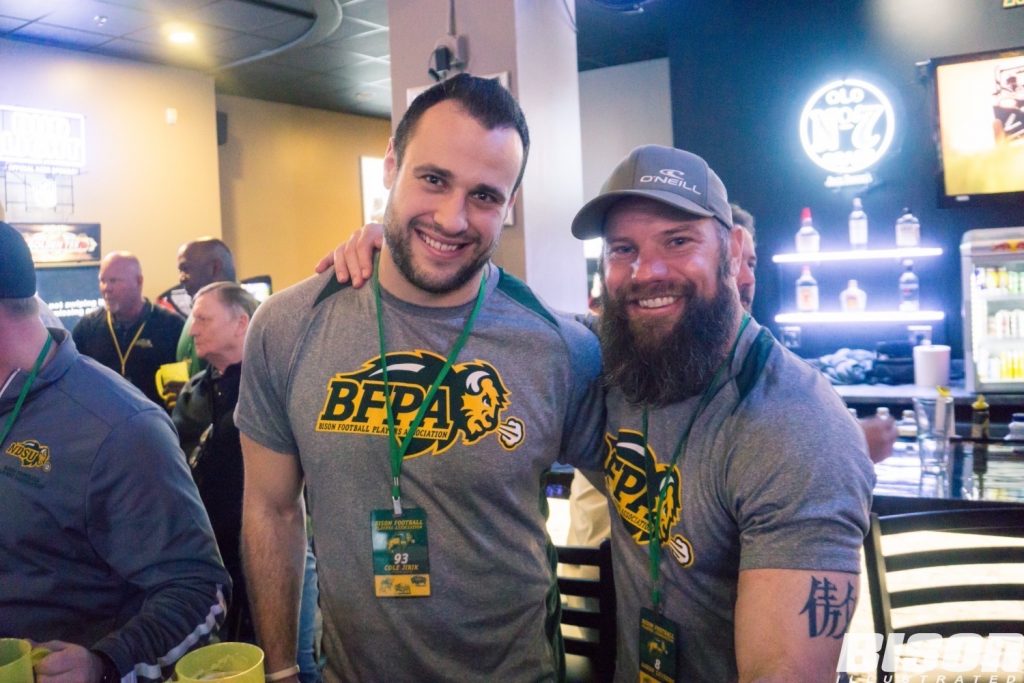
What do you think is something that a reader might not know about BFPA that they should know?
CJ: It’s looking at our goal and mission, and that’s to continue our culture into adulthood and life. We have always had each other’s back and as we get older, stuff is going to happen to guys. The BFPA is here to help people and help the community that gave so much to us. Whether it was the Toys For Tots event last year that was a massive success or helping someone in need. It’s important that people understand that this is not just a bunch of football players doing football things. Guys really care about the people that they played with and their community. It’s really investing in the culture that is the NDSU brotherhood. It’s a family up here and we’re trying to help.
CK: There’s a perception that it’s all about football and that’s not necessarily the case. We’re fortunate to have a platform where a lot of members want help and it’s fun to be able to do that.
How can people help get the word out? Or get involved even if they’re not a former football player? How can they help you guys and help the BFPA achieve those goals?
CJ: We have a ‘Donate’ button if they want to donate to anything. It’s all appreciated in that sense. All the money goes to helping people or supporting different groups. The money is not spent on frivolous things. We have donations so when stuff happens, we can jump at things right away and try to help stop the bleeding in certain situations. We will support people as fast as possible and they will not have to worry about the monetary value of things.
More Info
bisonfpa.com
facebook.com/BisonFPA
Twitter: @NDSU_BFPA
Instagram: @NDSU_BFPA

